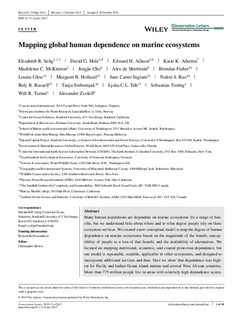Mapping global human dependence on marine ecosystems
| dc.contributor.author | Selig, Elizabeth R | |
| dc.contributor.author | Hole, David G | |
| dc.contributor.author | Allison, Edward H | |
| dc.contributor.author | Arkema, Katie K | |
| dc.contributor.author | McKinnon, Madeleine C | |
| dc.contributor.author | Chu, Jingjie | |
| dc.contributor.author | de Sherbinin, Alex | |
| dc.contributor.author | Fisher, Brendan | |
| dc.contributor.author | Glew, Louise | |
| dc.contributor.author | Holland, Margaret B | |
| dc.contributor.author | Ingram, Jane Carter | |
| dc.contributor.author | Rao, Nalini S | |
| dc.contributor.author | Russell, Roly B | |
| dc.contributor.author | Srebotnjak, Tanja | |
| dc.contributor.author | Teh, Lydia CL | |
| dc.contributor.author | Troëng, Sebastian | |
| dc.contributor.author | Turner, Will R | |
| dc.contributor.author | Zvoleff, Alexander | |
| dc.date.accessioned | 2019-10-04T09:39:19Z | |
| dc.date.available | 2019-10-04T09:39:19Z | |
| dc.date.created | 2019-03-17T17:58:34Z | |
| dc.date.issued | 2019 | |
| dc.identifier.citation | Conservation Letters. 2019,12 (2), 12:e12617. | nb_NO |
| dc.identifier.issn | 1755-263X | |
| dc.identifier.uri | http://hdl.handle.net/11250/2620272 | |
| dc.description.abstract | Many human populations are dependent on marine ecosystems for a range of benefits, but we understand little about where and to what degree people rely on these ecosystem services. We created a new conceptual model to map the degree of human dependence on marine ecosystems based on the magnitude of the benefit, susceptibility of people to a loss of that benefit, and the availability of alternatives. We focused on mapping nutritional, economic, and coastal protection dependence, but our model is repeatable, scalable, applicable to other ecosystems, and designed to incorporate additional services and data. Here we show that dependence was highest for Pacific and Indian Ocean island nations and several West African countries. More than 775 million people live in areas with relatively high dependence scores. By identifying where and how people are dependent on marine ecosystems, our framework can be used to design more effective large‐scale management and policy interventions. | nb_NO |
| dc.language.iso | eng | nb_NO |
| dc.publisher | Wiley | nb_NO |
| dc.rights | Navngivelse 4.0 Internasjonal | * |
| dc.rights.uri | http://creativecommons.org/licenses/by/4.0/deed.no | * |
| dc.title | Mapping global human dependence on marine ecosystems | nb_NO |
| dc.type | Journal article | nb_NO |
| dc.type | Peer reviewed | nb_NO |
| dc.description.version | publishedVersion | nb_NO |
| dc.rights.holder | © 2018 The Authors. | nb_NO |
| dc.source.pagenumber | 10 | nb_NO |
| dc.source.volume | 12 | nb_NO |
| dc.source.journal | Conservation Letters | nb_NO |
| dc.source.issue | 2 | nb_NO |
| dc.identifier.doi | 10.1111/conl.12617 | |
| dc.identifier.cristin | 1685396 | |
| cristin.unitcode | 7464,30,22,0 | |
| cristin.unitname | Vann og samfunn | |
| cristin.ispublished | true | |
| cristin.fulltext | original | |
| cristin.qualitycode | 1 |
Tilhørende fil(er)
Denne innførselen finnes i følgende samling(er)
-
Publikasjoner fra Cristin - NIVA [2147]
-
Scientific publications [1172]

